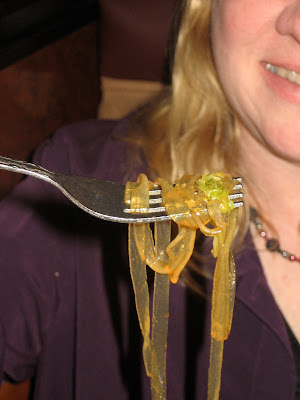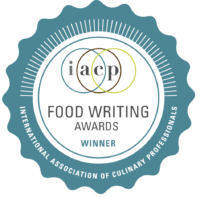Did the name of this blog entry make you do a double-take? We did one the first time we found mention of Islamic Chinese food. Himself and I were amazed when we discovered this cuisine a few years ago, but I’m not sure why. There’s a good size contingent of Muslim Uyghurs and other Hui in western China, so it makes sense that they’d have their own Halal cuisine. As you can imagine, there’s no pork on the menu, and no alcohol.
Our friend Pat joined us at China Islamic Restaurant in San Gabriel to re-explore this cuisine. As a chef, a vegetarian and a kosher Jew, she was keen to know what they’d serve.
The main thing we remembered from our first experience was being bowled over by the bread. I’d never had anything like it before. And once again, it was my favorite thing on the table. Nang is a huge round of bread topped with lots of sesame seeds, which are there for flavor, not just for decoration. The seeds toast during the baking, which brings out their rich, nutty flavor. (Some nang I’ve seen looks just like the noni we had in the Uzbek meal, right down to the identifying imprints made on it with a chekich. Since Xinjiang is just a few exits east of Uzbekistan on the Transasia Silk Road Expressway, this should come as no surprise.)
The bread has a thick, crackly crust and is delicate and moist on the inside. This size nang fed the three of us with plenty to carry home.
The standard nang has sesame seeds, but we ordered one with green onions lacing throughout. They were especially good with the toasted seeds.
Himself was enticed by the lamb stew, which showed up still simmering in a huge, rippin’-hot clay vessel. Between the ladle and chopsticks, our server manipulated cellophane noodles and succulent hunks of lamb into three soup bowls for us. Those fresh cilantro leaves lightened the richness of the stew and gave it a nice depth of flavor. The stew was a hearty meal all by itself. We left with several days’ worth of leftovers. (I certainly don’t have a problem with this–every extra meal I get from leftovers cuts the bill in half.)
I ordered the beef with dough-slice noodles. Called “dao xiao mian” in Chinese, they’re carved (or peeled) from a ball of dough by hand with a knife. They’re broad and irregular, almost shaggy in appearance, and really satisfying to eat. The noodles are broader than fettuccine, so you get a nice mouthful, but not as broad as lasagna, so that your mouth is blanketed in a single noodle. This dish gave us just the right proportion of velvety, lush noodles with spicy beef slices.
While both the eggplant and the tofu were in the same brown sauce, I didn’t have the feeling that we’d been given the same dish with only the main ingredient switched. The attendant sauce seemed to sing a different tune in each case, working in tandem with the tofu while providing a secondary flavor to the eggplant.
When you have a well-rounded, varied, flavorful meal in a place that observes dietary restrictions, you feel no sense of deprivation. I think that any diet that says no meat or no this-or-that or only this type of this-or-that would do well do be sure that it does a crack job of providing a really tasty meal of what it does permit. I’ve had vegetarian meals in a particular Indian restaurant that were so varied and tasty that I didn’t miss the meat. That’s a smart way to do it.
















